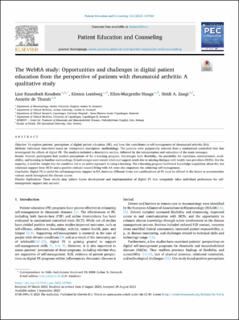| dc.contributor.author | Knudsen, Line Raunsbæk | |
| dc.contributor.author | Lomborg, Kirsten | |
| dc.contributor.author | Hauge, Ellen-Margrethe | |
| dc.contributor.author | Zangi, Heidi Andersen | |
| dc.contributor.author | de Thurah, Annette | |
| dc.date.accessioned | 2023-10-30T13:48:09Z | |
| dc.date.available | 2023-10-30T13:48:09Z | |
| dc.date.created | 2023-09-17T18:53:30Z | |
| dc.date.issued | 2023 | |
| dc.identifier.citation | Patient Education and Counseling. 2023, 116, Article 107969, 1-7 | en_US |
| dc.identifier.issn | 0738-3991 | |
| dc.identifier.uri | https://hdl.handle.net/11250/3099474 | |
| dc.description | This is an open access article under the CC BY license (http://creativecommons.org/licenses/by/4.0/). | en_US |
| dc.description.abstract | Objective: To explore patients’ perceptions of digital patient education (PE), and how this contributes to self-management of rheumatoid arthritis (RA).
Methods: Individual interviews based on ’interpretive description’ methodology. The patients were purposively selected from a randomized controlled trial that investigated the effects of digital PE. The analysis included a descriptive section, followed by the interpretation and extraction of the main messages.
Results: Overall, participants had positive perceptions of the e-learning program. Advantages were flexibility, the possibility for repetition, entertainment, availability, and learning in familiar surroundings. Disadvantages were unmet relational support needs due to missing dialogue with health care providers (HCPs). For the majority, a need for insight into the condition led to an active approach to using e-learning. The e-learning program facilitated knowledge acquisition about RA, but relational support from HCPs and a positive attitude toward living with RA were also important for achieving self-management.
Conclusion: Digital PE is useful for self-management support in RA, however different forms and combinations of PE must be offered in the future to accommodate various needs throughout the disease course.
Practice implications: These results may inform future development and implementation of digital PE that adequately takes individual preferences for selfmanagement support into account. | en_US |
| dc.language.iso | eng | en_US |
| dc.publisher | Elsevier | en_US |
| dc.rights | Navngivelse 4.0 Internasjonal | * |
| dc.rights.uri | http://creativecommons.org/licenses/by/4.0/deed.no | * |
| dc.subject | patients | en_US |
| dc.subject | self-management | en_US |
| dc.subject | rheumatoid arthritis | en_US |
| dc.subject | e-learning | en_US |
| dc.subject | digital patient education | en_US |
| dc.title | The WebRA study: Opportunities and challenges in digital patient education from the perspective of patients with rheumatoid arthritis: A qualitative study | en_US |
| dc.type | Peer reviewed | en_US |
| dc.type | Journal article | en_US |
| dc.description.version | publishedVersion | en_US |
| dc.rights.holder | © 2023 The Author(s). Published by Elsevier | en_US |
| dc.source.pagenumber | 1-7 | en_US |
| dc.source.volume | 116 | en_US |
| dc.source.journal | Patient Education and Counseling | en_US |
| dc.identifier.doi | 10.1016/j.pec.2023.107969 | |
| dc.identifier.cristin | 2175836 | |
| dc.source.articlenumber | 107969 | en_US |
| cristin.ispublished | true | |
| cristin.fulltext | original | |
| cristin.qualitycode | 2 | |

